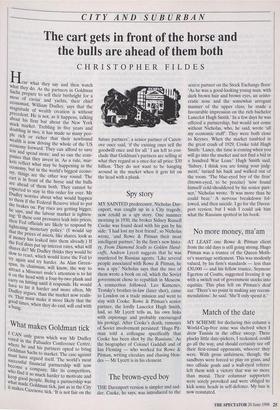CITY AND SUBURBAN
The cart gets in front of the horse and the bulls are ahead of them both
CHRISTOPHER FILDES
Hear what they say and then watch what they do. As the partners in Goldman Sachs prepare to sell their birthright for a mess of caviar and yachts, their chief economist William Dudley, says that the magnitude of wealth creation is without precedent. He is not, as it happens, talking about his firm but about the New York stock market. Trebling in five years and doubling in two it has made so many peo- ple rich or richer that their newfound wealth is now driving the whole of the US economy forward. They can afford to save less and spend more, and so can the com- panies that they invest in. As a rule, mar- kets reflect what may be happening in the economy, but in the world's biggest econo- my, things are the other way round. The cart is in front of the horse and the bulls are ahead of them both. They cannot be expected to stay in this order for ever. Mr Dudley worries about what would happen to them if the Federal Reserve tried to put the brakes on. Pay rises are getting bigger, he says, and the labour market is tighten- ing: 'If these cost pressures leak into prices, then Fed officials are likely to respond by tightening monetary policy.' (I would say that the prices of assets, like shares, look as if money has leaked into them already.) If the Fed does put up interest rates, what will shares do? Mr Dudley thinks they would be slow to react, which would leave the Fed to try again and try harder. As Alan Green- span, its chairman, will know, the way to attract a Missouri mule's attention is to hit it on the head with a four-by-two plank and carry on hitting until it responds. He would have to hit it harder and more often, Mr Dudley argues, than the market now realis- es. That must make it more likely that the good times, when they do end, will end with a bang.


























































 Previous page
Previous page